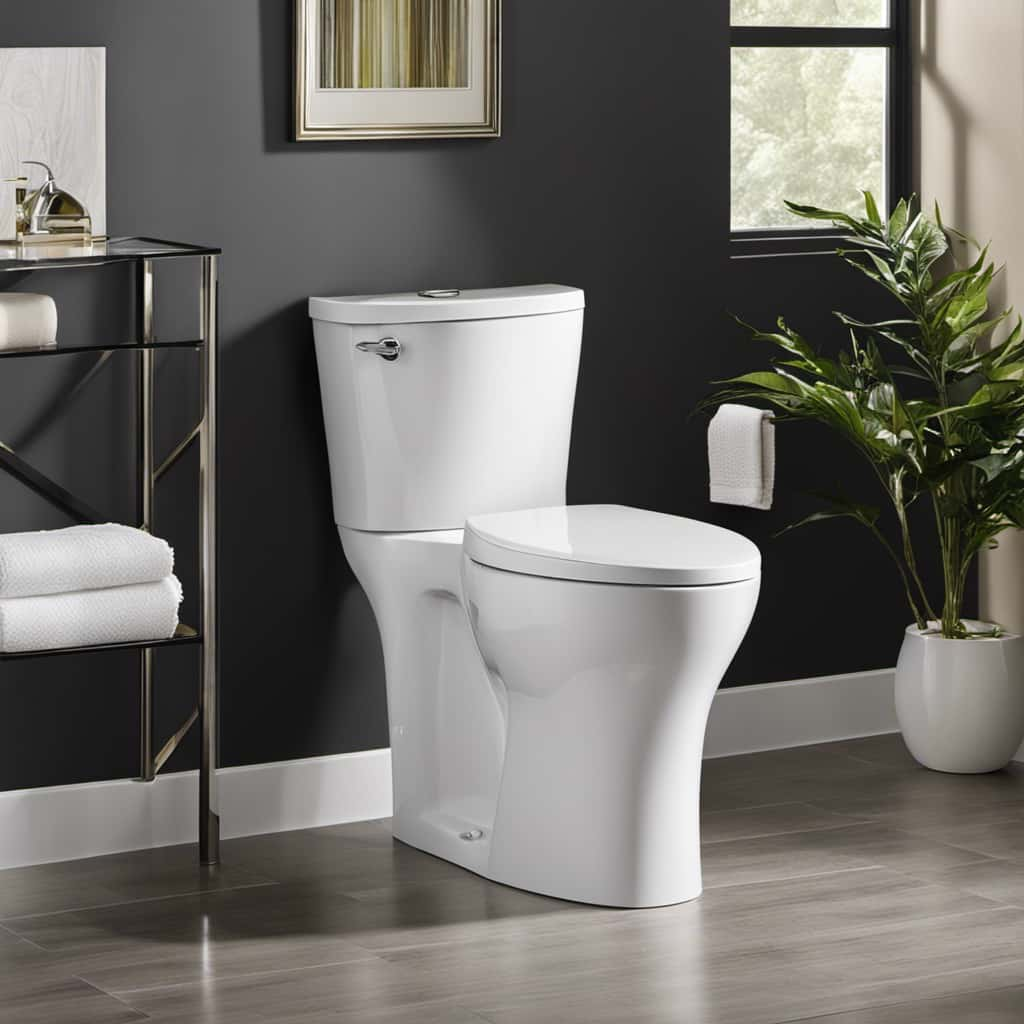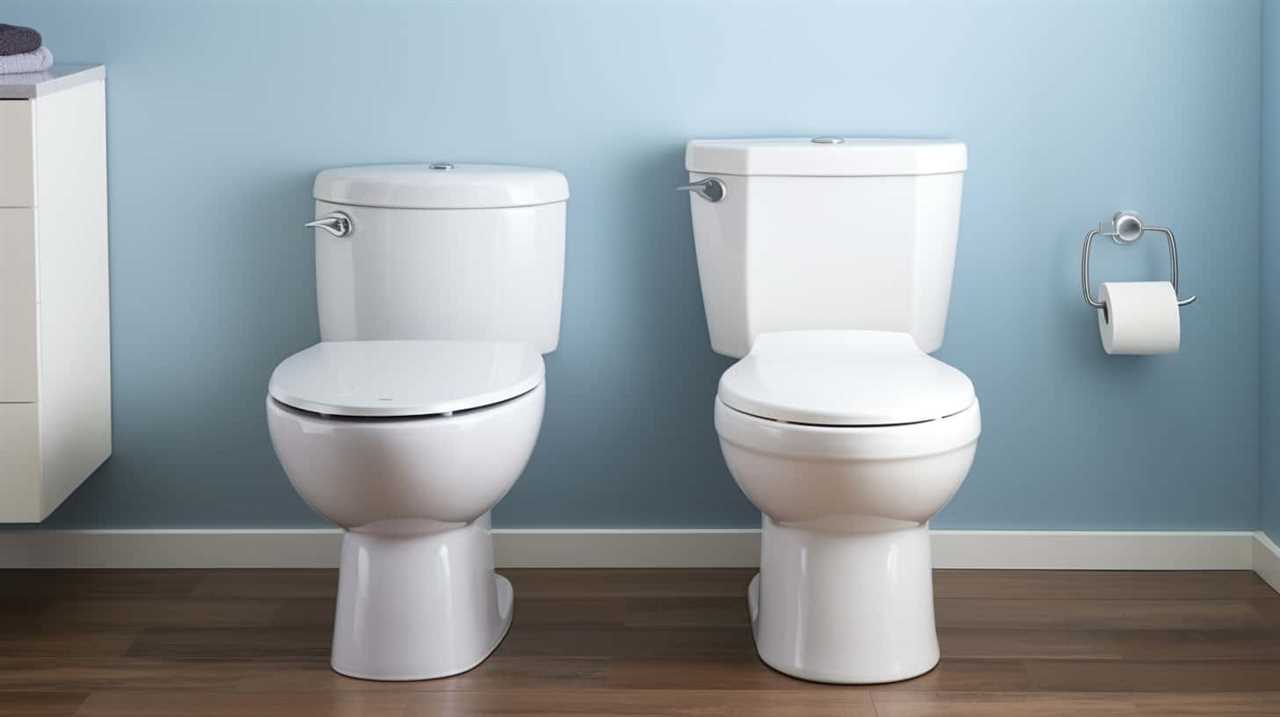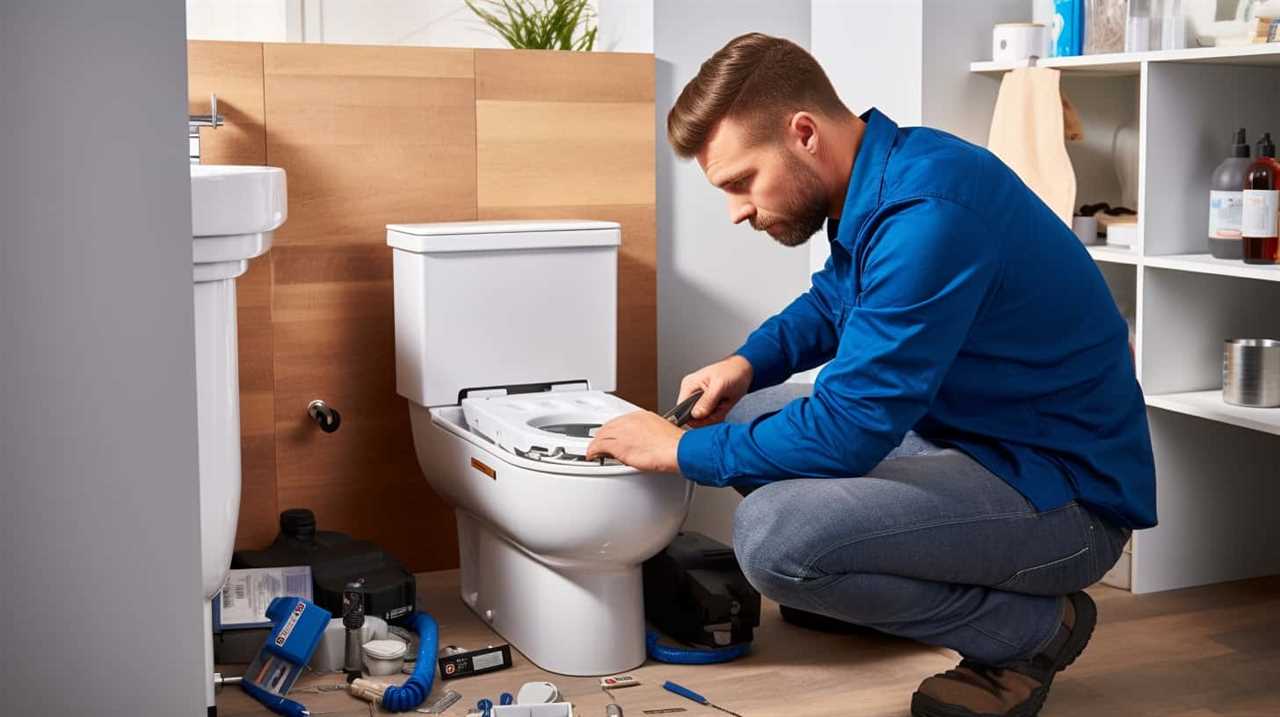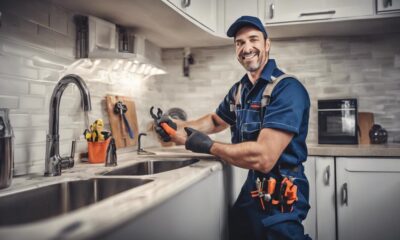Appliances
Why Shouldn’t You Flush Toilet Paper
2025

Have you ever wondered why we shouldn’t flush toilet paper? Well, let us enlighten you.
When we flush toilet paper, it may seem like a simple act, but it can actually lead to a host of plumbing problems. From clogged pipes to sewage system overload, the consequences can be severe.
Not to mention the environmental impact and potential health risks. In this article, we will explore the reasons behind this issue and provide alternative solutions.
Stay tuned for some eye-opening insights.
Key Takeaways
- Flushing toilet paper can cause clogged pipes and blockages, leading to costly repairs and inconvenience.
- Excessive flushing of toilet paper can overwhelm the sewage system, resulting in blockages, backups, and sewage spills.
- Flushing toilet paper contributes to water pollution and deforestation, and its production is energy-intensive and puts pressure on water resources.
- Flushing toilet paper can spread bacteria and cause health risks, especially when water sources are contaminated.
Plumbing Problems
To avoid potential plumbing problems, we should refrain from flushing toilet paper. Flushing toilet paper may seem harmless, but it can lead to costly repairs, inconvenience, and disruption.
When toilet paper is flushed, it travels through the pipes and into the sewer system. However, toilet paper isn’t designed to break down as quickly as other waste materials, such as human waste. This can cause the toilet paper to accumulate and create blockages in the pipes.
When blockages occur, it can result in costly repairs. Plumbers may need to be called in to remove the blockages and restore proper flow through the pipes. This can be not only expensive but also time-consuming. Additionally, the inconvenience and disruption caused by plumbing problems can be significant. Blocked pipes can lead to toilets not flushing properly or even overflowing, causing a mess that requires immediate attention.
Environmental Impact
In terms of its environmental impact, flushing toilet paper can contribute to water pollution and harm ecosystems. The production and disposal of toilet paper can have significant negative effects on our environment, particularly in terms of water pollution and deforestation. Here are three key reasons why flushing toilet paper can be detrimental to the environment:
- Water Pollution: When toilet paper is flushed down the toilet, it enters the sewage system and eventually ends up in water bodies such as rivers and lakes. The chemicals and pollutants present in toilet paper can contaminate these water sources, affecting the quality of water and harming aquatic life.
- Deforestation: Toilet paper is primarily made from virgin wood pulp, which requires the cutting down of trees. The demand for toilet paper contributes to deforestation, leading to the loss of valuable forest ecosystems and habitats for numerous plant and animal species.
- Energy and Water Consumption: The production of toilet paper involves energy-intensive processes such as wood pulp production, bleaching, and transportation. Additionally, large amounts of water are required for manufacturing toilet paper. These processes contribute to greenhouse gas emissions and put pressure on water resources.
Considering the significant environmental consequences of flushing toilet paper, it’s important to explore alternative solutions, such as using bidets, installing composting toilets, or opting for toilet paper made from recycled materials. By making conscious choices, we can help reduce water pollution and mitigate the impact on our ecosystems.
Sewage System Overload
Our flushing toilet paper can lead to an overload in our sewage system. When we flush toilet paper, it enters the sewage system along with other wastewater. The sewage system is designed to handle a certain amount of waste, including toilet paper. However, when too much toilet paper is flushed, it can overwhelm the system, leading to blockages, backups, and even sewage spills.
To illustrate the potential impact of flushing toilet paper on our sewage system, consider the following table:
| Sewage Treatment Process | Description | Potential Issues |
|---|---|---|
| Collection | Gathering wastewater and toilet paper | Blockages, backups |
| Treatment | Removing impurities and solids from water | Overcapacity, increased costs |
| Disposal | Releasing treated water into the environment | Environmental contamination, public health risks |
As the table shows, an overload in the sewage system can disrupt each step of the wastewater management process. Blockages and backups can occur in the collection phase, while overcapacity and increased costs can result from the excessive amount of toilet paper in need of treatment. Moreover, if the system is unable to handle the overload, there is a risk of environmental contamination and public health concerns.

Now that we understand the potential consequences of sewage system overload, let’s delve into the health risks associated with flushing toilet paper.
Health Risks
Flushing toilet paper frequently exposes us to potential health risks. Here are three reasons why:
- Spread of bacteria: When toilet paper is flushed, it can carry bacteria from fecal matter into the sewage system. These bacteria can then contaminate water sources and potentially cause illnesses such as gastrointestinal infections.
- Toilet paper shortages: In times of toilet paper shortages, flushing toilet paper can exacerbate the problem. Increased usage of toilet paper can overwhelm sewage systems, leading to blockages and backups. This can further strain the availability of toilet paper for individuals who truly need it.
- Cultural differences: Different cultures have varying practices when it comes to toilet hygiene. Some cultures prefer bidets or water-based cleaning methods instead of using toilet paper. Flushing toilet paper in areas where the sewage systems aren’t designed to handle it can lead to clogs and system failures.
These health risks associated with flushing toilet paper shouldn’t be taken lightly. In the next section, we’ll explore alternative options to flushing toilet paper that can help mitigate these risks and promote a healthier, more sustainable approach to personal hygiene.
Alternatives to Flushing Toilet Paper
To explore alternative options for handling toilet paper, we can consider using reusable cloth wipes or bidets. Reusable cloth wipes are an eco-friendly option that can be washed and reused, reducing waste and environmental impact. They’re made from soft and absorbent materials that can effectively clean without causing irritation. Many people find them to be a more comfortable and cost-effective alternative to traditional toilet paper.
Another option is the use of bidets. Bidets are devices that use water to cleanse after using the toilet. They’re commonly found in many European countries and are gaining popularity in other parts of the world. Bidets provide a thorough and hygienic cleaning experience and can help reduce the need for toilet paper altogether. They’re available in various models, including standalone fixtures or attachments that can be easily added to existing toilets.
In addition to reusable cloth wipes and bidets, another alternative worth considering is the use of composting toilets. Composting toilets are designed to break down human waste into compost, which can then be used as fertilizer. These toilets eliminate the need for water flushing and the use of toilet paper. While composting toilets may not be suitable for all households, they can be a sustainable option for those looking to minimize their environmental impact.
Frequently Asked Questions
Are There Any Benefits to Flushing Toilet Paper?
There may be some benefits to flushing toilet paper, but it’s important to consider alternative options.
Composting toilet paper can provide environmental benefits by reducing waste and contributing to soil health. Additionally, using biodegradable toilet paper options can further minimize the impact on the environment.

However, it’s crucial to remember that flushing toilet paper can lead to clogged pipes and sewage backups, causing costly repairs.
Therefore, it’s advisable to explore alternative methods for disposing of toilet paper.
What Are Some Common Misconceptions About Flushing Toilet Paper?
Many people don’t realize the environmental impact of flushing toilet paper. It’s a common misconception that it’s perfectly fine to flush it down the toilet. However, this can lead to clogged pipes and sewage backups.
Additionally, cultural differences play a role in whether or not toilet paper is meant to be flushed. In some countries, it’s common practice to dispose of toilet paper in a separate bin.
Understanding these misconceptions is crucial in maintaining proper plumbing systems and preserving the environment.
Can Flushing Toilet Paper Cause Damage to Plumbing Fixtures?
Flushing toilet paper can cause potential plumbing issues and long term consequences. It may lead to clogs in the pipes, resulting in blockages and backups. Over time, these blockages can cause damage to the plumbing fixtures, leading to costly repairs.
It’s important to dispose of toilet paper in the proper manner, such as using a waste bin or following guidelines for septic systems. Taking these precautions can help prevent unnecessary damage and maintain the integrity of your plumbing system.
Is It Safe to Flush Small Amounts of Toilet Paper?
When considering the safety of flushing small amounts of toilet paper, it’s important to analyze the potential risks. While it may appear harmless, even small quantities can lead to clogs and blockages in plumbing systems.
Our research shows that toilet paper isn’t designed to break down as rapidly as other materials used in wastewater treatment processes. Therefore, it’s advisable to dispose of toilet paper in a designated receptacle rather than flushing it, ensuring the proper functioning and longevity of your plumbing fixtures.
Are There Any Alternatives to Flushing Toilet Paper That Are More Environmentally Friendly?
When considering environmentally friendly alternatives to flushing toilet paper, bidet sprayers and composting toilets come to mind.
Bidet sprayers offer a more efficient and hygienic way to clean oneself without the need for excessive toilet paper usage.
Composting toilets, on the other hand, convert waste into nutrient-rich compost, reducing water usage and minimizing environmental impact.
These alternatives not only promote sustainability but also provide practical solutions for a more eco-conscious lifestyle.
Is it harmful to flush toilet paper and what are the potential consequences?
Flushing toilet paper can clog pipes and cause sewage backups, leading to costly repairs. One of the main reasons to avoid flushing toilet paper is that it can also contribute to environmental pollution, as it may not fully disintegrate and can harm water ecosystems.
Conclusion
In conclusion, it’s evident that flushing toilet paper can lead to a myriad of issues. From plumbing problems to environmental impact, sewage system overload, and even health risks, the consequences are far-reaching.
Instead of contributing to these problems, we should consider alternative methods for disposing of toilet paper. By doing so, we can protect our plumbing systems, reduce our environmental footprint, and ensure the well-being of ourselves and future generations.
- About the Author
- Latest Posts
Introducing Charles, the Editor in Chief at ByRetreat, whose passion for interior design and editorial excellence elevates every remote workspace to new heights. With his keen eye for detail, impeccable taste, and expertise in design, Charles brings a wealth of knowledge and creativity to the ByRetreat team.
As the Editor in Chief of a renowned lifestyle blog, Charles has honed his skills in curating captivating content and staying up-to-date with the latest trends in interior design. His deep understanding of aesthetics and the power of storytelling through design enables him to create remote workspaces that are not only visually stunning but also rich in personality and meaning.
Garage Door Opener
Reset Your Liftmaster Garage Door Opener After Power Outage: 3 Easy Steps
Unravel the secrets to effortlessly resetting your Liftmaster garage door opener after a power outage in just three easy steps.

Let’s address the task of resetting your Liftmaster garage door opener after a power outage with three simple steps. Power outages can disrupt your opener’s programming, but don’t worry, resetting it is possible.
Curious to discover the secrets to regaining control of your garage door opener effortlessly? Stay tuned as we unravel the simple yet effective methods to restore your opener's functionality post-power disruption.
Key Takeaways
- Disconnect the opener, use the emergency release cord, and reattach after power outage for proper functioning.
- Test the opener post-reset to ensure remote and smart device controls work correctly.
- Follow reset steps efficiently to avoid unexpected door openings and maintain garage door functionality.
- Consider preventive measures like backup power sources and regular maintenance to prevent future outages and ensure smooth operation.
Power Outage Impact on Opener
During power outages, Liftmaster garage door openers may lose their settings, requiring manual reconnection for proper functionality. When a power outage occurs, the Liftmaster opener relies on electricity to operate and may disconnect, affecting the garage door's automatic functions.
To address this, it's essential to disconnect the opener from the door manually. Start by locating the emergency release cord, typically hanging from the opener rail. Pull down on the cord to disconnect the opener from the door, enabling manual operation.
After the power is restored, reconnect the opener by guiding the door back into place and pulling the emergency release cord towards the motor. This action will engage the opener back with the door.
Following these proper steps ensures that the Liftmaster garage door opener resumes its normal functioning after a power outage. By promptly addressing the impact of power outages, you can maintain smooth operation of your garage door system.
Resetting the Garage Door Opener

After addressing the impact of a power outage on a Liftmaster garage door opener, the next crucial step is resetting the opener to restore its functionality efficiently.
To Reset Your Garage Door opener, begin by disconnecting it from the door by unplugging it. Then, locate the emergency release cord and pull it to manually open the garage door fully. Ensure the door is closed manually once power is restored before attempting to close it using the opener again. If necessary, reattach the garage door trolley to the opener to guarantee proper operation.
This process is essential in Garage Door Repair to ensure that the opener is synchronized with the door. By following these steps, you can successfully reset your garage door opener after a power outage, allowing you to regain control over your garage door's functionality promptly.
Testing the Reset Opener
To confirm the successful reset of your Liftmaster garage door opener, press the remote-control button and observe the garage door's response. After resetting, pressing the remote-control button shouldn't result in the garage door opening unexpectedly.
It's essential to check that any smart devices previously linked to the opener are also unable to open the garage door post-reset. This step in testing the reset opener ensures that the reprogramming process was effective.
If the garage door still opens unexpectedly after the reset, consult the owner's manual for troubleshooting steps specific to your make and model. Additionally, consider reaching out to a professional for further assistance if needed.
Frequently Asked Questions
How Do I Reset My Liftmaster Garage Door After Power Outage?
When power goes out, we disengage the opener from the door by pulling the emergency release cord. After manually closing the door, we're ready for reconnection.
Once power is restored, we press the button on the opener to close the door. If necessary, we manually reattach the trolley to the carriage for proper functionality.
These steps ensure a safe and effective reset of our Liftmaster garage door opener after a power outage.
How Do I Reset My Liftmaster Garage Door Opener?
When resetting your Liftmaster garage door opener, find the 'Learn' button on the motor unit. Hold down this button for about 6 seconds until the adjacent LED light goes off. This action erases all stored remote-control and keyless entry codes.
Following the reset, reprogram your remotes and keypads to reconnect with the opener. By completing these steps, you can restore your Liftmaster garage door opener's functionality after a power outage.
How Do I Manually Reset My Garage Door Opener?
When manually resetting a garage door opener, we first locate the emergency release cord and disconnect the opener from the door.
Then, we manually operate the door to the desired position.
After power is restored, we re-engage the opener by pulling the release cord towards the door.
It's crucial to ensure the door is fully closed before reconnecting it to the opener for automatic operation.
How Do I Restore the Power to My Garage Door?
When power goes out, restoring it to your garage door is crucial.
Simply plug the opener back in and ensure the door is fully closed using the manual release cord. Then press the opener button to automatically close it.
Check if the trolley needs reattaching to the opener carriage.
Following these steps will help re-engage your Liftmaster garage door opener after a power outage, ensuring your door operates smoothly.
Conclusion
In conclusion, resetting your Liftmaster garage door opener after a power outage is as simple as pressing and holding the Learn button for 6 seconds.
Like a symphony conductor resetting the tempo after a brief interruption, this process ensures that your opener is back in perfect harmony.
Don't forget to also relink any smart devices for a seamless operation.
Follow these steps to keep your garage door opener running smoothly.
- About the Author
- Latest Posts
Introducing Ron, the home decor aficionado at ByRetreat, whose passion for creating beautiful and inviting spaces is at the heart of his work. With his deep knowledge of home decor and his innate sense of style, Ron brings a wealth of expertise and a keen eye for detail to the ByRetreat team.
Ron’s love for home decor goes beyond aesthetics; he understands that our surroundings play a significant role in our overall well-being and productivity. With this in mind, Ron is dedicated to transforming remote workspaces into havens of comfort, functionality, and beauty.
Garage Door Opener
7 Steps to Reset Your Car Garage Door Opener
Hop on the path to garage door opener harmony with 7 essential steps that will transform your frustrating moments into seamless entries.

Picture yourself heading home after a tiring day, only to discover that your garage door opener is misbehaving like a defiant child. We’ve all experienced this frustration at some point. But don’t worry, we have the perfect solution for you.
In this discussion, we'll unravel the mystery behind resetting your car garage door opener in 7 simple steps, ensuring smooth operation and peace of mind every time you arrive home. So, let's get started on this journey to garage door opener enlightenment.
Key Takeaways
- Locate and press the Reset Button on the Garage Door Opener.
- Test the functionality of the remote control after resetting.
- Reprogram remote codes and check batteries for optimal performance.
- Follow troubleshooting tips to ensure smooth operation of your garage door opener.
Locate the Reset Button on Your Opener
To locate the reset button on your garage door opener, first, inspect the motor unit inside the garage for a button labeled 'LEARN' or 'HOME.' This button is crucial for resetting your opener and reprogramming it.
When you find the reset button, press and hold it to initiate the reset process. By doing this, you clear out old codes and unlink any remote devices that were previously connected to the opener.
Resetting your garage door opener is fundamental for ensuring proper functionality and security. After resetting, remember to re-pair each remote with the opener manually to establish a secure and efficient connection. This process allows for a fresh start, enabling you to program your remotes and keypads effectively.
With the reset button located and pressed, you're one step closer to a smoothly operating garage door opener.
Power Off the Garage Door Opener

Before proceeding with the reset process, ensure the garage door opener is powered off by unplugging it from the outlet.
Safety is paramount when dealing with electricity, so make certain there's no power flowing to the garage door opener during the reset. Disconnecting the power source is a critical initial step before attempting to reset the car garage door opener.
It's essential to verify that the garage door opener is completely powered down before moving forward with any reset actions. By ensuring the opener isn't connected to any power sources, you reduce the risk of accidents while performing the reset process.
Reset the Remote Control
Let's ensure your remote control is functioning optimally by following these steps:
- Check the batteries
- Reprogram the codes
- Test its functionality
These steps are crucial in resetting your car garage door opener and maintaining smooth operation.
Check Remote Batteries
Ensure that the remote control batteries are fully powered before proceeding with the reset of your car garage door opener. Weak or dead batteries can cause the remote to malfunction, hindering proper resetting.
To confirm battery power, check the LED indicator on the remote control; a dim or non-existent LED suggests low battery levels. Replace with new batteries, ensuring correct polarity, to guarantee successful reprogramming.
Adequate battery power is crucial for the remote to effectively transmit signals to the opener. By maintaining optimal battery levels, you ensure that the garage door opens seamlessly when you press the button on your remote control.
Reprogram Remote Codes
To reset the remote control for your car garage door opener, locate the LEARN button on the garage door opener unit. Press the LEARN button once to enter programming mode, indicated by the LED light.
Follow the specific instructions for your remote control to enter a new code or PIN. The LED light on the remote control will blink or flash to confirm successful programming.
Finally, test the newly programmed button on the remote to ensure it opens the garage door successfully.
- Press the Learn button
- LED light indicates programming mode
- Enter a new code or PIN
- Remote control LED confirms successful programming
- Test the remote for functionality
Test Remote Functionality
When testing the remote functionality of your car garage door opener, press the programmed button on the remote control to ensure proper communication with the garage door opener.
Check for the LED light on the remote control to blink or flash, indicating it's transmitting a signal.
Verify that the garage door responds by either opening or closing when the button is pressed.
If the garage door doesn't react, troubleshoot by reprogramming the remote control to sync it with the garage door opener. This step is crucial to guarantee that the remote control effectively triggers the garage door's mechanism.
Reprogram the Keypad

Under the keypad cover, you'll find the reset button to reprogram the keypad for your car garage door opener. To ensure smooth functionality, follow these steps to reprogram the keypad:
- Create a Personal Code: Input a new 4-digit code and press Enter to establish a personal access code.
- Set a Temporary Code: Follow the keypad instructions to set up a temporary 4-digit code for limited access situations.
- Follow Instructions: Adhere to the instructions provided under the cover to reset the keypad effectively.
- Save Codes: Finalize the setup process by pressing Enter to save the new codes, ensuring they're properly stored for future use.
- Test Functionality: After reprogramming, test the keypad to verify that the changes have been successfully implemented.
Program Your Car's Opener Button

Let's now address the process of programming your car's opener button and explore troubleshooting tips.
This step involves locating the module above the rearview mirror and erasing system data by pressing specific buttons. Once these initial steps are completed, you can proceed to program the button and ensure smooth garage door operation.
Button Programming Process
To begin programming your car's opener button, locate the garage door opener module above the rearview mirror and press and hold the outside buttons on the module for 30 seconds to erase system data. Once this is complete, follow these steps to program your garage door opener button in your car:
- Press the LEARN button on the opener unit.
- Press the button in the car panel to program.
- Use the remote control by pressing the program button on both the remote and car panel button.
- Ensure you hear two clicks to confirm successful programming of the car's opener button.
Troubleshooting Tips
When troubleshooting issues with your car's opener button programming, ensure all steps have been followed correctly to avoid potential programming errors.
For newer model vehicles, start by resetting the garage door opener by pressing the outside buttons on the module above the rearview mirror for 30 seconds.
Then, locate the Learn button on the garage door opener unit and press it to initiate the programming steps. Next, press the button on the car's panel until you hear 2 clicks, indicating successful programming.
Use the remote to further program by pressing the program button on both the remote and the car panel button. Remember to pay attention to the indicator light and release the Learn button promptly to complete the programming process accurately.
Test the Garage Door Opener

To verify proper functionality, press the programmed button on the remote control to test if the garage door opens. Make sure to pay attention to the following key points:
- LED Light: Check that the LED light on the remote control blinks or flashes when testing the garage door opener.
- Audible Cues: Listen for any audible cues from the garage door opener when testing the remote control operation.
- Smooth Operation: Confirm that the garage door opens smoothly and without any unusual sounds during the test.
- Multiple Controls: Repeat the testing process with multiple remote controls to ensure all are functioning correctly.
Testing the garage door opener is crucial to ensuring it operates as expected. By following these steps and checking for the mentioned indicators, you can ensure that your garage door opener is working efficiently and effectively.
Adjust Opener Settings if Necessary

If the garage door opener requires adjustments, accessing the control panel in the car above the rearview mirror allows for modification of settings like door opening height and closing speed. Using the control panel buttons, you can adjust these settings based on your preferences for a more personalized experience with your modern garage door opener.
It's crucial to follow the manufacturer's instructions to ensure proper adjustments tailored to your specific model. After making the necessary changes, be sure to save them by pressing the designated button on the control panel. To guarantee that the modifications meet your expectations, it's essential to test the operation of the garage door opener.
Frequently Asked Questions
How Do I Reprogram My Garage Door Opener in My Car?
To reprogram the garage door opener in our car, we erase system data by holding the outside buttons on the module for 30 seconds. Then, we press the LEARN button on the opener unit to start programming.
To finalize, press the button in the car panel until you hear 2 clicks for successful programming. Use the remote to program further by pressing the program button on both the remote and the car panel button.
How Do I Reset My Automatic Garage Door Opener?
When resetting an automatic garage door opener, locate the reset button and hold it for at least 6 seconds to clear old codes. Be careful of the door's movement during this process. Use a ladder if necessary to reach the reset button.
After resetting, reprogram your remote controls and keypad for smooth operation. Following these steps ensures your garage door opener works effectively and safely.
How Do I Clear My Garage Door Opener in My Car?
To clear your car garage door opener, press and hold the outside buttons on the module for 30 seconds to erase system data.
Then, press the LEARN button on the opener unit to start reprogramming.
Sync the opener with your vehicle by pressing the designated button on the car panel until hearing 2 clicks.
Finalize the programming by pressing the program button on both the remote and car panel button.
How Do I Reset My Garage Buttons on My Car?
When resetting the garage buttons on our car, we first locate the opener module above the rearview mirror.
Erase system data by holding the outside buttons for 30 seconds.
Then, press the LEARN button on the opener unit and program it by pressing the button on the car panel.
Finally, use the remote control to program it by pressing the program button on both devices.
Listen for two confirming clicks to ensure successful programming.
Conclusion
In conclusion, resetting your car garage door opener is like tuning a musical instrument – it requires precision and attention to detail.
By following the 7 simple steps outlined in this article, you can ensure that your garage door opener is functioning properly and securely.
Remember to test the programming and make any necessary adjustments to settings for smooth operation.
With a little effort, your garage door opener will be back in harmony with your daily routine.
- About the Author
- Latest Posts
Introducing Ron, the home decor aficionado at ByRetreat, whose passion for creating beautiful and inviting spaces is at the heart of his work. With his deep knowledge of home decor and his innate sense of style, Ron brings a wealth of expertise and a keen eye for detail to the ByRetreat team.
Ron’s love for home decor goes beyond aesthetics; he understands that our surroundings play a significant role in our overall well-being and productivity. With this in mind, Ron is dedicated to transforming remote workspaces into havens of comfort, functionality, and beauty.
Garage Door Opener
How to Stop My Chamberlain Garage Door Opener From Beeping Every 30 Seconds
Hungry for a quiet garage? Discover how to silence the beeping on your Chamberlain opener every 30 seconds.

Have you ever wondered how to stop the constant beeping from your Chamberlain garage door opener every 30 seconds? It can be quite annoying, but don’t worry, there are practical solutions we can implement to fix this problem and bring tranquility back to your garage.
By exploring common reasons for the beeping, checking the battery status, resetting the opener, adjusting settings and sensors, and potentially reaching out to Chamberlain support, we can work towards a solution that eliminates the bothersome noise and ensures your opener functions smoothly.
Key Takeaways
- Low battery backup is a common cause of beeping every 30 seconds.
- Solid red LED indicates a completely drained battery that needs replacement.
- Resetting the garage door opener can help troubleshoot and stop the beeping.
- Regular maintenance of sensors and settings prevents beeping issues.
Common Reasons for Beeping
When troubleshooting a beeping Chamberlain garage door opener, understanding the common reasons for the beeping is essential in identifying the issue efficiently.
One prevalent cause of the beeping is a low battery backup. The beeping every 30 seconds serves as a warning signal for this specific issue. Accompanying this alert, a flashing orange light indicates the low battery backup status.
If the LED light on the opener is solid red, it signifies that the battery backup is completely drained. To address this, replacing the battery is necessary to stop the beeping. It's crucial to promptly attend to this matter to prevent the beeping from persisting every 30 seconds.
Check Battery Status

Checking the LED light on the garage door opener is crucial to determine the battery status. When you observe a solid red LED light, it signals a dead battery. This red light, accompanied by beeping every 30 seconds, indicates the urgent need for a battery replacement to address the issue effectively.
Additionally, a flashing orange light on the LED screen signifies low battery power and serves as a warning for an impending battery replacement requirement. By monitoring the LED light colors on your garage door opener, you gain valuable insights into the battery status, enabling you to take proactive steps to prevent the continuous beeping interruptions.
Understanding and responding promptly to these LED indicators play a vital role in maintaining the smooth operation of your garage door system. Remember, being attentive to these LED signals can help you avoid unnecessary disruptions and ensure that your garage door opener functions optimally.
Resetting the Garage Door Opener
To address persistent beeping with your Chamberlain garage door opener, resetting the device can often resolve the issue. Follow these steps to reset your garage door opener:
| Step | Instructions |
|---|---|
| 1 | Locate the 'Learn' button on the garage opener. |
| 2 | Press and hold the 'Learn' button for about 6 seconds until the LED blinks. |
| 3 | Release the button and wait for the LED light to turn off and then back on. |
| 4 | Test the opener by using the remote control to check if the beeping has stopped. |
| 5 | If the beeping persists, check the battery backup or contact Chamberlain support. |
Resetting the garage door opener is a straightforward process that can often eliminate the beeping sound. By following these instructions, you can quickly troubleshoot and resolve the issue. Remember, if the beeping continues, it may be necessary to investigate the battery backup or seek assistance from Chamberlain customer support.
Adjusting Settings and Sensors

Adjust sensor settings on your Chamberlain garage door opener to ensure proper alignment and prevent beeping. Proper alignment of the sensors is crucial for the smooth operation of your garage door opener. Here are some steps to help you adjust settings and sensors effectively:
- Check Alignment: Verify if the sensors are facing each other directly. Misalignment can trigger beeping issues.
- Adjust Sensor Position: Ensure the sensors aren't obstructed and are aligned correctly. Minor adjustments can make a significant difference.
- Clear Obstructions: Remove any debris or objects that might be blocking the sensor's line of sight. Even small items can disrupt the sensor's functionality.
- Regular Maintenance: Periodically inspect and maintain the sensor alignment to prevent beeping problems. This proactive approach can help you avoid interruptions in your garage door opener's operation.
Contacting Chamberlain Support
When reaching out to Chamberlain Support for assistance with beeping garage door openers, it is advisable to have your model number and a brief description of the issue ready. Contacting Chamberlain support can provide valuable insights and solutions to resolve the beeping concern promptly. Whether it's an annoying beep every 30 seconds or a persistent beeping issue, Chamberlain's knowledgeable customer service team is equipped to help. You can reach Chamberlain support at 1-800-528-9131 for technical support, troubleshooting guidance, and warranty assistance related to your Chamberlain garage door opener.
Chamberlain Support Contact Information
| Contact Method | Phone Number | Availability |
|---|---|---|
| Phone | 1-800-528-9131 | 24/7 |
| support@chamberlain.com | Mon-Fri, 8am-6pm CST | |
| Online Chat | Available on Website | Mon-Sun, 24/7 |
Frequently Asked Questions
Why Is My Chamberlain Garage Door Opener Beeping Every 30 Seconds?
We've noticed that your Chamberlain garage door opener beeps every 30 seconds due to a low battery backup status. This is indicated by a flashing orange light.
When the battery is completely drained, a solid red light appears, leading to the continuous beeping.
Promptly replacing the battery backup will stop the beeping and ensure your Chamberlain garage door opener functions correctly.
How Do I Stop My Chamberlain Battery From Beeping?
Sure thing!
To stop the Chamberlain battery from beeping, we need to address the root cause. Check the LED light on the garage door opener. A solid red light means the battery is dead and requires replacement.
Unplugging the opener and removing the battery can temporarily silence the beeping. However, replacing the battery backup promptly is crucial for proper operation and to permanently eliminate the beeping sound.
How Do I Stop My Garage Door From Beeping?
To stop the beeping on your garage door opener, check if it has a low battery backup power. If so, replace the battery to resolve the issue. It's important to address this promptly to prevent further disruptions.
A solid red LED light indicates a completely drained battery, while a flashing orange LED light means the battery level is low. By replacing the battery, you can stop the beeping and ensure smooth operation of your garage door opener.
Why Does My Liftmaster Beep Every 30 Seconds?
We hear the beeping every 30 seconds because the Liftmaster garage door opener is alerting us to a low battery backup status. This warning is crucial for maintaining the functionality of the system.
When the battery is completely drained, a solid red LED light will indicate this. The beeping is a helpful reminder to replace the backup battery promptly to ensure continued operation of the garage door opener.
Conclusion
In conclusion, we've successfully addressed the issue of the Chamberlain garage door opener beeping every 30 seconds. By following the steps outlined, including checking the battery, resetting the opener, and adjusting settings and sensors, we were able to resolve the problem effectively.
Remember, when in doubt, it's always best to reach out to Chamberlain support for further assistance. Keep calm and garage door on!
- About the Author
- Latest Posts
Introducing Ron, the home decor aficionado at ByRetreat, whose passion for creating beautiful and inviting spaces is at the heart of his work. With his deep knowledge of home decor and his innate sense of style, Ron brings a wealth of expertise and a keen eye for detail to the ByRetreat team.
Ron’s love for home decor goes beyond aesthetics; he understands that our surroundings play a significant role in our overall well-being and productivity. With this in mind, Ron is dedicated to transforming remote workspaces into havens of comfort, functionality, and beauty.
-

 Decor3 days ago
Decor3 days agoMaximalist Decor Explained: Embrace More Style
-

 Vetted3 weeks ago
Vetted3 weeks ago15 Best Drip Irrigation Systems to Keep Your Garden Thriving
-

 Vetted1 week ago
Vetted1 week ago15 Best Foot Massagers for Neuropathy to Soothe Your Feet and Relieve Discomfort
-

 Vetted2 weeks ago
Vetted2 weeks ago15 Best Sports Laundry Detergents for Keeping Your Activewear Fresh and Clean
-

 Vetted2 weeks ago
Vetted2 weeks ago15 Best Tall Toilets for Seniors That Combine Comfort and Safety
-

 Vetted3 weeks ago
Vetted3 weeks ago15 Best Dish Scrubbers to Keep Your Kitchen Sparkling Clean
-

 Decor3 weeks ago
Decor3 weeks agoWhat Is Eclectic Home Decor
-

 Decor1 week ago
Decor1 week agoWhere the Wild Things Are Nursery Decor




























